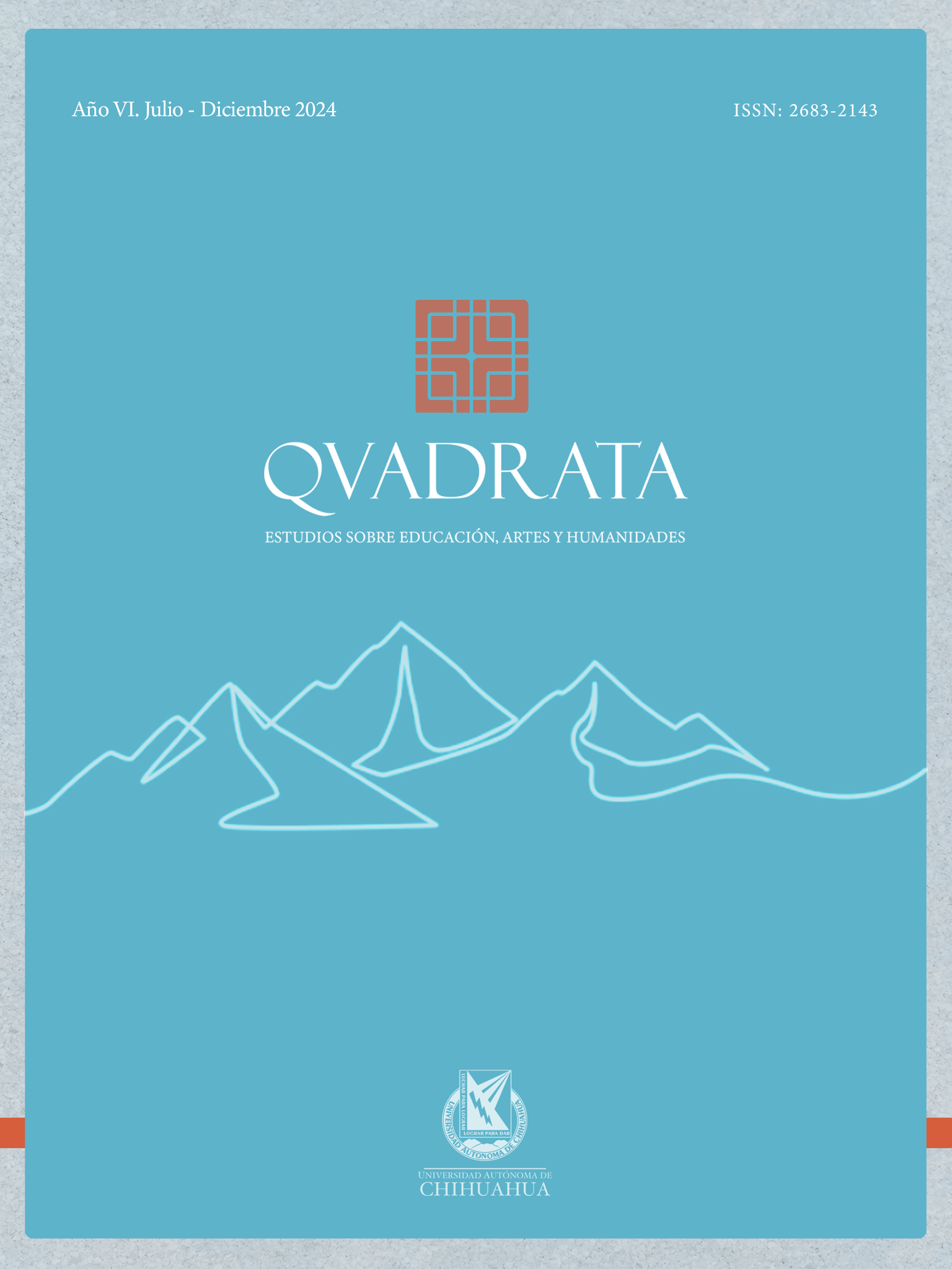Learning-teaching strategies in primary and secondary education under the educational model of 4.0: literature review
DOI:
https://doi.org/10.54167/qvadrata.v6i12.1459Keywords:
Education 4.0, Learning Strategies, Gamification, Flipped Classroom, Immersive Education, Storytelling, MakerspacesAbstract
Introduction: training in the skills of the 21st century requires profound changes in the learning-teaching processes, being the education model 4.0 focused on the development of such skills, encouraging, in turn, with the approach and principles of neuroeducation.
Objective: to systematize research information on the learning-teaching strategies employed under the educational model 4.0
Method: study of qualitative approach, descriptive level, bibliographic method of systematic review of literature. 93 texts were included in the final revision, in English and Spanish, published between 2018 and 2023.
Results: There is a growing interest in the edutainment approach, which encourages positive emotions, motivation, attention and multi-sensory learning; use of strategies supported by cutting-edge technological advances such as makerspaces, immersive education, mobile learning, which allow to promote experience-based learning, improve attention and concentration, allow the personalization of learning, boost memory and memory, and increase student motivation and engagement; strategies aimed at encouraging active participation, individualization of learning, practice, immediate feedback and focus on meaningful learning, such as flipped classroom; and strategies such as storytelling, aimed at improving communication and learning by leveraging emotional connection, activating multiple brain areas related to sensory perception and imagination, coherence and narrative structure, episodic memory and the activation of mind theory.
Discussion and conclusions: The strategies employed in the educational model 4.0 are aligned with the principles of the educational approach based on neuroeducation, indicating the great relevance of teacher training in technological and scientific advances in order to employ knowledge about the human brain in the structuring of teaching practices that favor the development of skills for the 21st century in students
References
Azhari, A., Priono, P. y Nuriadi, N. (2018). Speech Acts of Classroom Interaction. International Journal of Linguistics, Literature and Culture, 4(2), 24-45. https://sloap.org/journals/index.php/ijllc/article/view/72
Austin, J. (1990). Cómo hacer cosas con las palabras. (3ra reimpresión). Barcelona: Paidós.
Berko, J. y Bernstein, N. (1999). Psicolingüística. (2da ed.). Madrid: Editorial Mc Graw Hill.
Bernstein, B. (1977). La estructura del discurso pedagógico. Madrid: Morata.
Bermudez, M. (2021). El discurso académico del profesor. Funciones de la entonación en la conferencia universitaria. Universidad Central “Martha Abreu” de las Villas, Santa Clara, Cuba. https://dspace.uclv.edu.cu/bitstream/handle/123456789/12819/attachment5-2.pdf?sequence=1&isAllowed=y
Cassany, D., Luna, M. y Sanz, G. (2000) Enseñar lengua (6ta edic.). Barcelona: Graó Editores.
Chakin, M. y Dibdyaningsih, H. (2019). An analysis of teacher speech act in giving motivation for English students. Journal of English Language Teaching and Islamic Integration, 2(2), 218-229. https://doi.org/110.31227/osf.io/yzh34
De Almeida, F., de Oliveira Marques, P., Adão, J., Teixeira, Z. y Porto, M. (2019) The Paradigms of Traditional Educational Culture in the Context of Liquid Modernity: An Empirical Study. Creative Education, 10, 784-795. https://doi.org/10.4236/ce.2019.104058.
Guadarrama, J. E. (2022). Intencionalidad, actos de habla y creación de la realidad social en John Searle. Repositorio de la Universidad Autónoma del Estado de México. http://hdl.handle.net/20.500.11799/113122
Hall, M., Hall, W. y Caselli, N. (2019). Deaf children need language, not (just) speech. First Language, 39(4), 367-395. https://doi.org/10.1177/0142723719834102
Halliday, M. (1998). El Lenguaje como Semiótica Social. Colombia: Fondo de Cultura Económica.
Hernández, D. (2021). El aula revisitada: la innovación de los espacios educativos desde un enfoque comunicativo. EDUR. Educação em Revista, 37(e23204). http://dx.doi.org/10.1590/0102-469823204.
Jaramillo-Valencia, B., Castaño-Barreneche, L. y Ossa-Álvarez, K. (2022). El habla y su desarrollo a través de la didáctica. Revista Docencia Universitaria, 23(1), 1-21. https://doi.org/10.18273/revdu.v23n1-2022001
Kroetz, K., da Silva Gallon, M. y Ferraro, J. (2020). The supremacy of the writing over orality: an analysis of mathematical practices of subjects of a german colonization region. Cadernos de História da Educação, 19(2), 614-627. https://doi.org/10.14393/che-v19n2-2020-20
Leona, P. (2021). Mentira, actos de habla y actos políticos. Formas y funciones de la (in) sinceridad en el discurso de campaña (2015/2019). [Tesis de Maestría], Universidad Nacional de Quilmes, https://ridaa.unq.edu.ar/handle/20.500.11807/3896
Llorenç, A. (2018). La enseñanza del lenguaje en la escuela. Lengua oral, lectura y escritura. Barcelona: UOC.
Ministerio de Educación y Deportes (2005). Currículo de Educación Inicial. Caracas: Autor.
Porlán, R. (1998). Constructivismo y escuela. (4ta. Edición). Sevilla: Díada.
Rodrigo, S. (2020). «Perdona/termine»: Los actos de habla directivos en mediaciones laborales. Verba: Anuario Galego de Filoloxía, 47, 87-106. https://doi.org/10.15304/verba.47.5725
Rodríguez, M. E. (1995). “Hablar en la escuela: ¿Para qué? ¿Cómo? Lectura y Vida, 16(3), 31-40. http://www.lecturayvida.fahce.unlp.edu.ar/numeros/a16n3/16_03_Rodriguez.pdf
Santamarina, M. y Núñez, M. (2018). Formación sobre didáctica de la lengua oral de los docentes de Educación Infantil: un estudio comparativo. Profesorado: revista de curriculum y formación del profesorado, 22(1), 177-196. https://recyt.fecyt.es/index.php/profesorado/article/view/63640
Santosa, A. y Kurniadi, A. (2020). Speech act analysis of teacher talk in EFL classroom. Journal Penelitian Humaniora. 21(2), 101-107. https://doi.org/10.23917/humaniora.v21i2.9871
Searle, J. (1986). Actos de Habla. Madrid: Cátedra.
Sumedi, S. y Rovino, D. (2020). Speech Act Analysis of English Teacher Talk at SMP Negeri 1 Rangkasbitung. Journal of English Language and Culture, 10(2), 121-131, https://journal.ubm.ac.id/index.php/english-language-culture/article/view/2142
Toro, S. y Tejeda, R. (2020). Estudio diagnóstico de la expresión oral como habilidad comunicativa en la educación inicial. Revista Electrónica Formación y Calidad Educativa (REFCalE), 8(2), 59-75. http://refcale.uleam.edu.ec/index.php/refcale/issue/view/281.
Yépez, E. y Padilla Álvarez, G. (2021). La oralidad y las dimensiones del lenguaje en los infantes. Revista Cognosis. 6(EE-I-), 1-22. https://doi.org/10.33936/cognosis.v6i0.1973
Zamora Úbeda, Z. (2021). Los actos de habla en el discurso docente. Revista Científica de FAREM-Estelí, 10(40), 64-80. https://doi.org/10.5377/farem.v10i40.13045
Downloads
Published
How to Cite
Issue
Section
License
Copyright (c) 2024 Olena Klimenko, Nubia Hernández-Flórez, Melina Alejandra Estrada Vélez, Manuela Narváez Cortes, Esteban Sepúlveda Cespedes, Diana Lucia Arroyave-Jaramillo

This work is licensed under a Creative Commons Attribution-NonCommercial 4.0 International License.





 QVADRATA. Estudios sobre Educación, Artes y Humanidades año V, número 9, enero-junio de 2023, es una publicación semestral editada por la Universidad Autónoma de Chihuahua. Calle Escorza #900. C.P. 31000, Chihuahua, Chih. Tel. (614) 439-1500 ext. 3844,
QVADRATA. Estudios sobre Educación, Artes y Humanidades año V, número 9, enero-junio de 2023, es una publicación semestral editada por la Universidad Autónoma de Chihuahua. Calle Escorza #900. C.P. 31000, Chihuahua, Chih. Tel. (614) 439-1500 ext. 3844, 
